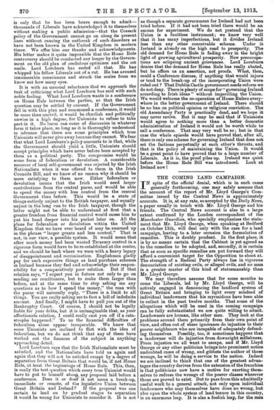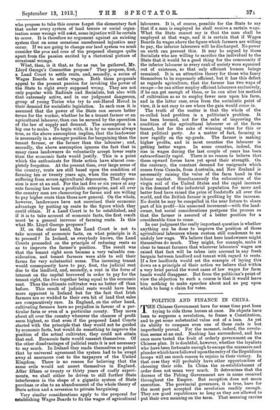THE COMING LAND CAMPAIGN.
TN spite of the official denial, which is in such cases generally forthcoming, one may safely assume that the account of the report of Mr. Lloyd George's Com- mittee issued by the Central News is approximately accurate. It is, at any rate, so accepted by the Daily News, a paper usually in touch with Mr. Lloyd George and his friends. The Central News account is also to a large extent confirmed by the London correspondent of the Manchester Guardian, who specially emphasizes the state- ment that Mr. Lloyd George, when speaking at Bedford on October 11th, will deal only with the case for a land campaign, leaving to a later occasion the formulation of remedies. This is doubly prudent. In the first place, it is by no means certain that the Cabinet is yet agreed as to the remedies to be adopted, and, secondly, it is certain that as soon as specific remedies are put forward they will afford a convenient target for the Opposition to shoot at. The strength of a Radical Party always lies in vigorous denunciation of existing evils, or alleged evils, and no man is a greater master of this kind of statesmanship than Mr. Lloyd George.
We may therefore assume that for some months to come the Liberals, led by Mr. Lloyd George, will be actively engaged in denouncing the landlord system of Great Britain and bringing to light every misdeed of individual landowners that his myrmidons have been able to collect in the past twelve months. That some of the allegations which will be used in the coming campaign can be fully substantiated we are quite willing to admit. Landowners are human, like other men. They look at the problems around them primarily from their own point of view, and often out of sheer ignorance do injustice to their poorer neighbours who are incapable of adequately defend- ing themselves. Possibly, too, it sometimes happens that a landowner will do injustice from downright selfishness. Prom injustice we all want to escape, and if Mr. Lloyd George or any other politician brings into prominent notice undoubted cases of wrong, and gibbets the author of those wrongs, he will be doing a service to the nation. Indeed we are inclined to think that one of the greatest advan, tages the country derives from the extension of the franchise is that politicians now have a motive for exerting them, selves to redress the wrongs of the poorer classes wherever those are proved to exist. But to pass from this admittedly useful work to a general attack, not only upon individual landowners who may themselves have done no wrong, but also upon the whole system of land tenure in this country, is an enormous leap. It is also a foolish leap, for the men who propose to take this course forget the elementary fact that under every system of land tenure or social organ- isation some wrongs will exist, some injustice will be certain to occur. It is therefore no argument against an existing system that on some occasions unredressed injustice may occur. If we are going to change our land system we must consider the pros and cons of the proposed changes quite apart from the passion excited by a rhetorical picture of occasional wrongs.
What, then, is it that, as far as can be gathered, Mr.. Lloyd George's Committee propose? They propose, first, a Land Court to settle rents, and, secondly, a series of Wages Boards to settle wages. Both these proposals appeal to the present passion for invoking the power of the State to right every supposed wrong. They are not only popular with Radicals and Socialists, but also with that extremely active, and in our judgment dangerous, group of young Tories who try to out-Herod Herod in their demand for socialistic legislation. In each case it is assumed that the power of the State can secure better terms for the worker, whether he be a tenant farmer or an agricultural labourer, than can be secured by the operation of the law of supply and demand. The assumption is a big one to make. To begin with, it is by no means always true, as the above assumption implies, that the landowner is necessarily in a stronger position for bargaining than the tenant farmer, or the farmer than the labourer ; and, secondly, the above assumption ignores the fact that in many cases landowners do voluntarily accept lower rents than the economic facts would justify. This is a point which the enthusiasts for State action have almost com- pletely forgotten. At the present time, over large areas of the country, rents are still based upon the condition of farming ten or twenty years ago, when the country was suffering from severe agricultural depression. That depres- sion is now at an end. For the last five or six years at any rate farming has been a profitable enterprise, and all over the country men are clamouring for farms and are willing to pay higher rents than those now general. On the whole, however, landowners have not exercised their economic advantage by putting up rents to the figure which they could obtain. If a Land Court is to be established, and if it is to take account of economic facts, the first result must be a general increase of farming rents. Is this what Mr. Lloyd George proposes ?
If, on the other hand, the Land Court is not to take account of economic facts, on what principle is it to proceed ? In Ireland, as everybody knows, the Land Courts proceeded on the principle of reducing rents so as to improve the farmer's position. The result was that the tenant right soon became a very valuable con- sideration, and tenant farmers were able to sell their farms for very substantial sums. The incoming tenant would consequently have to pay, first, the judicial rent due to the landlord, and, secondly, a rent in the form of interest on the capital borrowed in order to pay for the tenant right, the two together being equal to the economic rent. Thus the ultimate cultivator was no better off than before. This result of judicial rents would have been more apparent in Ireland but for the fact that Irish farmers are so wedded to their own bit of land that sales are comparatively rare. In England, on the other hand, cultivating farmers have no prejudice in favour of a par- ticular farm or even of a particular county. They move about all over the country wherever the chances of profit seem highest, so that even if the proposed Land Courts started with the principle that they would not be guided by economic facts, but would do something to improve the position of the actual cultivator, they could not attain that end. Economic facts would reassert themselves. Of the other disadvantages of judicial rents it is not necessary to say much. In Ireland they made themselves so patent that by universal agreement the system had to be swept away at enormous cost to the taxpayers of the United Kingdom. There is no reason for believing that the same evils would not assert themselves in England. After fifteen or twenty or thirty years of costly experi- ments, we shall either be driven to still further State interference in the shape of a gigantic system of State purchase or else to an abandonment of the whole theory of State action and a reversion to private bargaining.
Very similar considerations apply to the proposal for establishing Wages Boards to fix the wages of agricultural labourers. It is, of course, possible for the State to say that if a man is employed he shall receive a certain wage. What the State cannot say is that the man shall be employed at that wage, and it is certain that if Wages Boards fix wages above the figure which farmers are willing to pay, the inferior labourers will be discharged. No power on earth can prevent this. It may be argued by those Socialists who are willing to sacrifice the individual to the State that it would be a good thing for the community if the inferior labourer in every rank of society were squeezed out of existence, so that only efficient human beings remained. It is an attractive theory for those who fancy themselves to be supremely efficient, but it has this defect as regards agriculture, that the farmer has two ways of escape—he can either employ efficient labourers exclusively, if he can get enough of them, or he can alter his method of cultivation so as to employ fewer men upon his farm, and in the latter case, even from the socialistic point of view, it is not easy to see where the gain would come in.
The truth of the matter is that the whole of the so-called land problem is a politician's problem. It has been boomed, not for the sake of improving the condition of the agricultural labourer or of the farm tenant, but for the sake of winning votes for this or that political party. As a matter of fact, farming is now rapidly on the up-grade. The farmer is making higher profits, and in most counties the labourer is getting better wages. In some counties, indeed, the rise in wages during the last couple of years has been extraordinarily rapid. There is no reason to believe that these upward forces have yet spent their strength. On the contrary, the constant demand for emigrants which comes from Canada, from Australia, and New Zealand is necessarily raising the value of the farm hand in the labour market. Simultaneously the exhaustion of the virgin soil of the United States and the rapid increase in the demand of the industrial population for more and better food have raised the price of foodstuffs all over the world, and the British farmer is profiting by the increase. No doubt he may be compelled in the near future to share part of his profit—his unearned increment—with the land- owner, but social considerations postpone the process so that the farmer is assured of a better position for a considerable time to come.
In our judgment the really important question is whether anything can be done to improve the position of those agricultural labourers whom custom still condemns to an unduly low wage. We believe that here landowners might themselves do much. They might, for example, make it clear to tenant farmers that wherever labourers' wages are raised that fact will be taken into account in any fresh bargain between landlord and tenant with regard to rents. If a few landlords would set the example of laying this down as a principle of their action we believe that within a very brief period the worst cases of low wages for farm hands would disappear. But from the politician's point of view the objection to such a course is that it would leave him nothing to make speeches about and no peg upon which to hang a claim for votes.











































 Previous page
Previous page